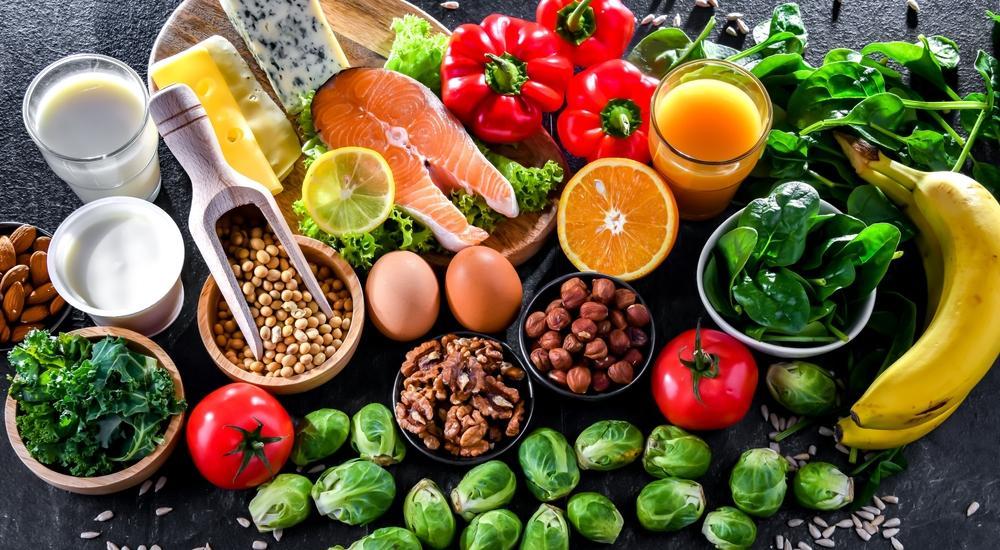Calcium is an important trace mineral for maintaining bone rigidity and organ functionality. Deficiency in this mineral can lead to osteoporosis and symptoms such as cramps, heart palpitations, and insomnia.
Milk is the most popular calcium supplement, but it is not the only choice. Yvonne Cai, a nutritionist at Taiwan’s Koii Nutrition Consultation Center, introduced several types of vegetables and fruits that can help enhance calcium intake during an interview with the Epoch Times’ “Health 1+1” program. She also recommended three daily meal combos to supplement calcium effectively.
Supplement Calcium Early to Strengthen Bones
Calcium helps maintain strong bones in the human body. Insufficient calcium can decrease bone density, making bones fragile and prone to problems such as osteoporosis and fractures.
Cai said it is difficult to significantly increase bone density in older osteoporosis patients, even if they consume a large amount of calcium. Therefore, to prevent osteoporosis, one should start building bone density at a younger age rather than waiting until symptoms appear.
Humans attain their peak bone mass between the ages of 25 and 30. After 40, bone mass decreases gradually, and the loss continues with age. However, a lot of us can significantly slow bone mass density loss through proper nutrition supplements and regular exercise.
According to Cai, external stimulation, such as weight training, can activate our osteoblasts (bone-forming cells) and increase their rigidity. Daily exercise, such as walking, jogging, etc., is also good for keeping our bones healthy.
As for calcium supplementation, the recommended total daily calcium intake varies from one age group to another. For example, the recommended intakes are as follows:
- About 1,300 milligrams for children and adolescents aged 9 to 18
- About 1,000 milligrams for people aged 19 to 50
- About 1,000 milligrams for men aged 51 to 70
- About 1,200 milligrams for women aged 51 to 70
- About 1,200 milligrams for people aged 71 and over
Vegetables Are Another Good Option
Many people will first think of milk when it comes to calcium supplements. There are many types of milk and dairy products on the market, and each product’s calcium content and absorption rate differ.
Cai said that the calcium in milk is mainly composed of calcium caseinate, calcium phosphate, and soluble calcium. Because of the combination with casein, calcium can be slowly released in the intestines, thus increasing the absorption rate, so the calcium absorption rate of milk can reach as high as 35 percent to 45 percent.
She added that in Asia, dairy products are not the primary source of calcium. Many rely on other foods such as vegetables, beans, and grains. Most of the high-calcium vegetables are dark green, such as kale, which contains about 250 milligrams of calcium per 100 grams (3.5 ounces). This amount is even higher than that of milk, which contains about 120 milligrams of calcium per 100 grams. In addition, amaranth also has a high content of calcium, about 200 milligrams per 100 grams.
It should be noted that the oxalates in vegetables can affect calcium absorption. In some high-oxalate vegetables, such as spinach, oxalic acid will combine with calcium to form calcium oxalate, thereby reducing the absorption rate of calcium. Conversely, vegetables with low oxalate content, such as kale, broccoli, cabbage, etc., have higher calcium absorption rates.
5 Foods for Calcium
Cai recommended the following five foods as high-quality calcium supplements to help people absorb calcium much more easily:
- Dairy products: Milk, especially, has a high calcium absorption rate and is easy to integrate into the daily diet. Drinking 240 milliliters (8 fl. ounces) of fresh milk daily is sufficient to achieve 25 percent of the daily calcium demand.
- Organic dried beans and tofu: Solidified soy products are rich in calcium. 100 grams (3.5 ounces) of tofu contains 350 milligrams of calcium. Soy products are also high in protein and suitable for vegetarians and those who are lactose intolerant.
- Kelp: Every 100 grams (3.5 ounces) of kelp contains almost 170 milligrams of calcium. Kelp is also rich in iodine, magnesium, and dietary fiber and low in calories. It is most suitable for people who are cautious about weight control but want to supplement calcium. It is also ideal for vegetarians and those who are lactose intolerant. It can be used as a soup base or for salads.
- Black sesame seeds: The calcium content of black sesame seeds is about 10 times that of milk. Studies have shown that sesamin and other components in sesame seeds have antioxidants and anti-inflammatory, cholesterol-lowering, liver-, and kidney-protective effects. Black sesame seeds can be used to make sauces or added to porridge, bread, and lattes to boost flavor and calcium.
- Sardines: Sardines are rich in protein and unsaturated fatty acids. However, it should be noted that they have a high sodium content, too. Excessive sodium intake may interfere with the intestinal absorption of calcium, so sardines should be consumed in moderation.
Cai also said that the phosphoric acid, sugar, sodium, and caffeine in carbonated drinks affect calcium absorption. Excessive phosphate causes an imbalance in the body’s calcium-phosphorus ratio. Also, it affects its acid-base balance, leading to a decrease in bone density and thus increasing the risk of osteoporosis.
In particular, during adolescent growth periods, consuming large amounts of carbonated drinks may have lifelong adverse effects on bones. Some studies have mentioned that consuming enormous quantities of carbonated beverages during adolescent growth periods may reduce bone mineral accumulation and increase the risk of future bone fractures. In addition, excessive consumption of carbonated drinks may also lead to fat accumulation and even obesity, affecting physical health.
3 Food Combos to Enhance Calcium Absorption
Cai mentioned that calcium absorption is affected by many factors, including the type of food eaten, digestion capacity, the amount of gastric acid secreted, and the interaction between the foods ingested simultaneously.
The following seven nutrients are recommended to promote calcium absorption:
- Magnesium
- Vitamin D
- Vitamin K
- Zinc
- Copper
- Sulfur
- Boron
She recommends eating more foods rich in these nutrients, such as pumpkin seeds, shiitake mushrooms, salmon, kale, oysters, asparagus, and prunes.
Research shows that prunes are rich in potassium, boron, copper, vitamin K, and a variety of phenolic compounds, such as chlorogenic acid, phenolic acids, and flavonoids, which have antioxidant and anti-inflammatory properties and enhance osteoblast function and inhibit bone breakdown. Adding prunes to your diet can protect bone health by preventing and reversing bone loss.
To replenish calcium, in addition to choosing high-calcium foods, Cai recommends the following three combinations:
- High-calcium food + source of vitamin D: One example is milk with boiled or poached eggs. Milk is rich in calcium, while eggs are rich in vitamin D, which helps improve calcium absorption.
- High-calcium food + acidic food: An example is cheese with tomatoes. Acidic foods can promote the release and absorption of calcium and help improve the efficiency of calcium ion absorption in the intestines. They are especially suitable for people with insufficient gastric acid secretion.
- High-calcium foods + magnesium sources: One example is a kale or seaweed salad with organic tofu and nut crumbles. Kale and organic tofu contain both calcium and magnesium. Paired with magnesium-rich nuts, they help maintain a balanced relationship between calcium and magnesium. Magnesium can help regulate calcium stability and prevent bone loss.













